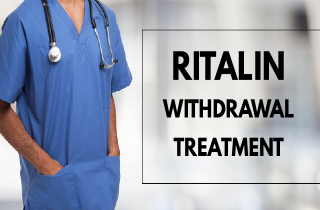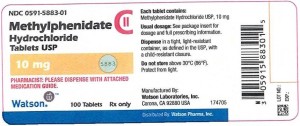ARTICLE OVERVIEW: Ritalin (methylphenidate) withdrawal is usually NOT life threatening. If you have been taking Ritalin as prescribed, most symptoms of Ritalin withdrawal are mild and resolve within a week. More on in this article what to expect during detox and how symptoms can be treated.
TABLE OF CONTENTS:
- Psychoactive Effects
- Why Withdrawal Occurs
- Dependence vs. Addiction
- Duration
- Symptoms
- Treatment
- Medications That Help
- Is Detox At Home Possible?
- Safety
- Signs of a Drug Problem
- Who Uses Ritalin?
- Your Questions
Psychoactive Effects
Ritalin (methylphenidate) is a central nervous system stimulant commonly prescribed for attention-deficit hyperactivity disorder (ADHD) and narcolepsy. Most prescriptions come in tablet, capsule, or liquid form, which a person takes by mouth. Long-term use can result in dependence and withdrawal symptoms upon quitting.
Additionally, Ritalin can produce effects similar to cocaine and amphetamines when misused. In fact, methylphenidate has a high potential for abuse and is a Schedule II substance under the Controlled Substances Act. Its use is enforced by the DEA.
Why Withdrawal Occurs
Ritalin acts on monoamine neurotransmitter systems in the brain, which include norepinephrine and dopamine. Stimulants like Ritalin enhance the effects of these chemicals. When used as prescribed, stimulants have a paradoxical calming effect on the brain. But like other drugs in the stimulant category, it is possible for people to become dependent on it.
Dependence is a predicted outcome of taking methylphenidate daily. It occurs because the brain needs to adapt to stimulant effects in order to continue functioning. To do so, it “slows down” some effects. Then, when you take the Ritalin out of the system, these “slowed down” functions manifest until the brain has time to readjust to the non-chemical state. These “slowed down” symptoms like fatigue, depression, and muscle aches usually resolve within a couple of weeks…but can be difficult to deal with.
Dependence vs. Addiction
Still, dependence is different than a “drug problem”.
When used to get high, drugs like Ritalin can be addictive. An increase in dopamine signaling can induce a feeling of euphoria. But it comes with a risk. These medications’ effects on norepinephrine increase blood pressure and heart rate, constrict blood vessels, increase blood glucose, and open up breathing passages. Indeed, nonmedical use of stimulants for cognitive enhancement poses potential health risks, including addiction, cardiovascular events, and psychosis.
In other words, Ritalin can temporarily produce an artificial feeling of pleasure; it produces its pleasurable effects by chemically acting like certain normal brain messenger chemicals, which produce positive feelings in response to signals from the brain. The result is an addiction to Ritalin because the person can depend on the immediate, fast, predictable high it provides. At the same time, Ritalin short circuits interests in and the motivation to make life’s normal rewards work. More and more confidence is placed on Ritalin while other survival feelings are ignored and bypassed.
Duration
The effects of Ritalin withdrawal vary by person, but can generally be expected to begin 12 to 24 hours after use stops. The detoxification process for Ritalin can take a while to complete, with acute detox from Ritalin resolving 3-5 days, while some major symptoms can persist for 1-2 weeks, or longer.
Still, the total amount of time spent in Ritalin withdrawal will vary in severity and length according to patterns of use. The duration of withdrawal depends on the dosing amount, frequency of dosing, and the overall duration of time the person used Ritalin. Individual factors such as age, gender, weight, individual drug metabolism, and overall health also play a role in duration of withdrawal.
Symptoms
Withdrawal symptoms seem to be most severe in the initial days following cessation of use, although people using Ritalin as prescribed can expect less intense symptoms than Ritalin addicts or abusers. Initial depression and feeling anxious are common in the first days of Ritalin withdrawal, with an intense craving for Ritalin sometimes present.
Stimulant withdrawal symptoms can include:
- Aggression.
- Depression.
- Disturbed sleep patterns.
- Dysphoria (a dissatisfaction with life).
- Extreme fatigue.
- Insomnia.
- Prolonged periods of sleep.
- Sleepiness.
Repeated misuse of some stimulants (sometimes within a short period) can lead to feelings of hostility or paranoia, or even psychosis. Further, taking high doses of a stimulant may result in dangerously high body temperature and an irregular heartbeat. There is also the potential for cardiovascular failure or seizures.
Treatment
The first step in Ritalin withdrawal is to seek assessment. Your doctor can help you determine the level of dependence to the drug and then suggest a treatment plan. Often, experts help to taper the drug dosage and attempt to ease withdrawal symptoms. Gradually reducing methylphenidate dosage over the course of a few weeks can help minimize the severity and intensity of withdrawal symptoms during detox, but requires medical supervision.
Successful treatment during Ritalin withdrawal may also incorporate several components, including detoxification, counseling, and medications. Multiple courses of treatment may be needed for the person to make a full recovery. This is why medical assessment is critical during Ritalin withdrawal.
If addiction is discovered, do not fret! It is a medical condition and is treated medically. The two main categories of drug addiction treatment are behavioral treatments and medications. Behavioral treatments help change unhealthy patterns of thinking and behavior; teaching strategies to manage cravings and avoid cues and situations that could lead to relapse; or, in some cases, providing incentives for abstinence. This often takes the form of individual, family, or group counseling, and can help you improve your personal relationships and ability to function at work and in the community.
Medications
Treatment for withdrawal from prescription stimulants like methylphenidate is symptomatic. Symptoms are usually not medically life threatening and do not require pharmaceutical intervention. Still, some medications may be used during Ritalin withdrawal to treat symptoms and provide support. These include:
- Antidepressants, used to minimize risk of doing harm to self or others.
- Benadryl, used for sedation and for effects on possible dermatologic problems (itching and hypersensitivity of the skin).
- Drug craving medications, medicines such as bromocriptine, amantadine may address cravings for Ritalin, but without clear results.
- Neuroleptics, this class of drugs can be used if needed to treat psychotic episodes provoked by high doses of methylphenidate.
Additionally, alternative treatments such as acupuncture to the ear may help ease symptoms of Ritalin withdrawal. But in any case, plenty of bed rest and drinking plenty of fluids is indicated as the body adapts to the absence of methylphenidate.
Is It Possible to Detox At Home?
Medical supervision is best when getting of Ritalin. In cases of prescription use, seek the advice of your prescribing doctor and follow her/his suggestions.
If you’ve been abusing Ritalin…seek medical help. In most cases, people underestimate how difficult it will be to stop using this drug. Methylphenidate detox can trigger severe psychiatric episodes and poses the following risks:
- Detox can be difficult and as a result many people give up and relapse back into addiction; even worse, the emotional depression, extreme anxiety and thoughts of suicide can lead to a devastating end.
- Quitting the drug suddenly can cause heart complications and stroke. Without medical supervision, detox at home could turn lethal.
- When withdrawal symptoms become excessive, many people panic and take more of the drug and this can lead to an overdose and can lead to a serious health risks like convulsions, an elevated temperature, heart rate and blood pressure, and hallucinations.
For the reasons stated above, qualitative medical supervision is usually required. This is why experts do not usually recommend that the person detox at home. Moreover, persons undergoing drug detox need to know that someone cares for them, and respects them.
Safety
Ritalin withdrawal is not typically life threatening. However, withdrawal effects can be physically and psychologically uncomfortable, and people may relapse to ease symptoms. People may also experience depression and suicidal thoughts when withdrawing from Ritalin.
Psychiatric side effects can also be triggered during cases when you are abusing Ritalin. According to this study published in the medical journal, The Primary Care Companion in 2000, this can include [1]:
- Delerium
- Delusions
- Hallucinations
- Paranoia
- Violence
For the safety of the person, doctors suggest that you seek guidance of specialized medical personnel when getting off Ritalin. So, always seek a medical opinion before, during, and after withdrawal. The support of family and loved ones can help you get through the difficult time..
Signs of a Drug Problem
People choose to abuse methylphenidate for various reasons. Certain people choose to abuse it to use it recreationally. Typically, a person who abuses methylphenidate may experience the following signs of addiction:
- Appetite loss.
- Anxiety.
- Restlessness.
- Irregular heartbeat.
- Headache.
In certain cases, methylphenidate abuse can also lead to death. Persons who have heart defects are at an increased risk of death from methylphenidate abuse. Why do people become addicted to Ritalin and others don’t? This NIDA video explains how some people are vulnerable to addiction, while others aren’t.
If you have a problem with Ritalin, it can be treated! Reach out for help to your prescribing doctor. Or, call us on the hotline listed on this page. Ritalin addiction occurs in around 10% of all users…and it’s a medical condition. Why suffer alone? Reach out for help.
Who Uses Ritalin?
If you think that you may have an addiction to Ritalin, you are not the only one facing this problem. Indeed, we’d like to present you with a few facts to let you know that you are not alone…
According to the DEA, a wide spectrum of the population has abused methylphenidate products. Still, the primary abusers are individuals younger than 25 years old who often obtain methylphenidate from a friend or classmate. They mainly use this drug as a study aid or to party. In fact, people misuse these drugs in the absence of medical need in an effort to enhance mental performance. [2]
How many people might have a problem?
According with the National Survey on Drug Use and Health (NSDUH), in 2015, 3.5 million people aged 12 or older used methylphenidate products in the past year, about 1.3 percent of the population. Then, in 2016 an estimated 540,000 people aged 12 or older had a stimulant use disorder. This number of people with a stimulant use disorder, representing 0.2 percent of people aged 12 or older. [3]
- An estimated 0.2 percent of adolescents aged 12 to 17 had a stimulant use disorder, which represents about 56,000 adolescents.
- Approximately 170,000 young adults aged 18 to 25 and 315,000 adults aged 26 or older had a stimulant use disorder in 2016. These numbers correspond to 0.5 percent of young adults and 0.1 percent of adults aged 26 or older.
Additionally, militaries have long used stimulants to increase performance in the face of fatigue, and the United States Armed Forces allow for their use in limited operational settings. Using Ritalin is now also reported by some professionals to increase their productivity, by older people to offset declining cognition, and by both high school and college students to improve their academic performance.
Your Questions
Do you still have questions about how to withdraw from Ritalin? Please ask them below. Or, if you have been through Ritalin withdrawal and have some tips or suggestions to add, we welcome your experiences. We will try to respond to all comments personally and promptly.












Related Posts